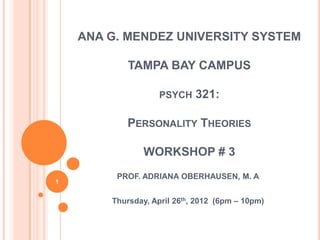
Presentation class # 3
- 1. ANA G. MENDEZ UNIVERSITY SYSTEM TAMPA BAY CAMPUS PSYCH 321: PERSONALITY THEORIES WORKSHOP # 3 PROF. ADRIANA OBERHAUSEN, M. A 1 Thursday, April 26th, 2012 (6pm – 10pm)
- 2. CLASS # 2 REVIEW OF TOPICS 1. Psychoanalytic Theory 2. Ethical Aspects related to the use of these Theories. Genetic Aspects that may contribute to our personality. 2
- 3. PSYCHOANALYTIC FREUD, ERIKSON, JUNG psychoanalytic theory psychopathology reconstruct the The result of failing to personality rather than meet some critical solve immediate developmental task or problems; focus on the becoming fixated at past and analyze the some early level of aspects of the development. unconscious that are Stages of manifested in present psychosexual behavior development oral, anal, phallic, latency, genital 3
- 4. PSYCHOANALYTIC FREUD COUNSELING TECHNIQUES: Id, Ego, Super Ego Id = symbolizes the child (instincts) free association Ego = The Adult permitting the client to say (realistic thinking) whatever come to mind in Super Ego = The Old person order to reveal the = Wisdom, Perfectionism. (Internal representative of the unconscious. traditional values and ideals of dream analysis society as interpreted by the individual) dreams are interpreted through contributions of Freud's theory free association seeking first systematic theory of personality, framework for exploring meaning or symbols of the a person's history = Assessment, unconscious mind. resolving resistance to therapy. 4
- 5. PSYCHOANALYTIC FREUD Clinical terms used today: Limitations Freud's theory prolonged training, lengthy Countertransference period of therapy, not measurable, does not take The therapist’s reaction into account social, to toward the client cultural, and interpersonal interferes with objectivity, variables, the client must usually a result of a need be of average to above of the therapist. average intelligence and Wealthy….. cannot be Transference: The client’s used in crisis counseling reaction toward the therapist. 5
- 6. ADLERIAN THERAPY Psychosocial base: lifestyle assessment To learn about one’s The main tool of adlerian attitudes toward life is the theory, questionnaire main goal by confronting about the client's family, basic mistakes and memories, dreams, and assumptions. self-concepts, explores The client holds particular birth order and interaction belief’s that may be among family wrong. Adlerians therapists attempt to replace them with healthier ones. 6
- 7. ADLERIAN THERAPY Therapist's role in Contribution of Adler's adlerian therapy: therapy It initiated a movement The therapist serves as toward other a guide, the main humanistic theories, responsibility is placed influential on the on the client and a cognitive-behavioral contract may be theories, family developed between therapies and mental clinician and client. health work and those culturally diverse. 7
- 8. ADLERIAN THERAPY Limitations of Adler's theory: Inability to validate concepts, and an over simplification of complex human functioning. 8
- 9. END OF REVIEW OF INFORMATION FROM CLASS #2 9
- 10. CLASS # 3 Behavior Theory, Cognitive Theory & Setting where they can be used, plus Practical Use. 10
- 11. BEHAVIOR THEORY PAVLOV, SKINNER, BANDURA, ELLIS, ETC. Main goal of behavior theory The role the therapist in behavior 1. Identify Irrational Beliefs therapy: To make the problem clear, 2. It is to eliminate negative learned behavior by using Rational Beliefs To verbalize the consequences , 3. Goals should be specific, concrete and Serves as a model for the client, measurable. (Treatment Plans Today) Formulates alternate outcomes, 4. There is also a focus on changing the Develops natural Incentives environment to modify client’s (Reinforcers, Rewards) and Consequences (punishment) to behaviors. eliminate (Extinguish) an undesirable behavior. 11 Observe the Environment
- 12. Contributions of behavior BEHAVIOR THEORY theory: Techniques that can be used with Techniques are based on empirical research, behavior theory: Treatment is based on the assessment of the individual. It is effective on short-term, Reinforcement, modeling, asserti and has long term positive effects. veness training, combination of It can be applied to culturally diverse populations and to individuals with High or very behavior modification and other Low Intelligence. Particularly beneficial with theories, behavior plans, etc. people with Physical, Mental or Developmental Disabilities….. (Because these people depend on their environment for safety) 12
- 13. BEHAVIOR THEORY Limitations of behavior theory: success greatly depends upon the ability to control environmental factors, does not address philosophical problems, or past history may not be considered important. It is difficult for teachers and parents to learn and implement methods. They often personalize issues and blame the child. 13
- 14. BANDURA Social learning theory Famous Technique: Systematic desensitization Bandura's theory that Clients with extreme anxiety says behavior is (agoraphobia, fear of elevators, crowded places) understood by taking with gradual and into consideration progressive anxiety producing situations social condition under resulting in defusing the which learning occurs. anxiety and improved 14 socialization, etc.
- 15. FOUNDER OF RET (RATIONAL-EMOTIVE THERAPY) ELLIS These irrational thoughts RET (Rational Emotive are replaced with Rational Therapy). ones. “I am of average Later, CBT (cognitive- weigh in comparison to behavior therapy) most women” “I am evolved out of Ellis’s important and I can be a theory. winner” The therapist helps identify Irrational Psycho-education: The Though patterns the individual then is educated client has adopted. “I on how our Thinking am overweight” “I am affects how we Feel or a looser, I am not Emote. How we feel important” affects our Behavior. 15
- 16. COGNITIVE BEHAVIOR THERAPY Contributions of CBT: Counseling is brief. Widely used and preferred by most Practice is emphasized in Insurances. Medicaid, HMO’s, etc. consults, helps improve the Reason? client’s ability to control their It is cost effective $$$. destiny, dialogues helps client It is measurable. to change behavior, clients accept responsibility, It can be short term. particularly good for crisis Reduced client dependency on situations. treatment. 16 Can be used in all settings, homes, schools, families, etc.
- 17. LIMITATIONS OF COGNITIVE BEHAVIORAL THERAPY Limitations of CBT: The reason for irrational beliefs is not explored. Emotional issues are not generally explored. It is future oriented and not too concerned with past. Unlike Psychoanalysis. 17
